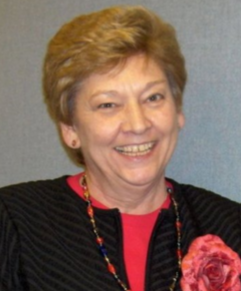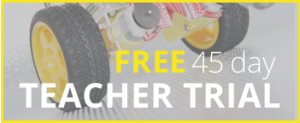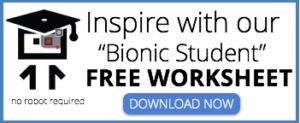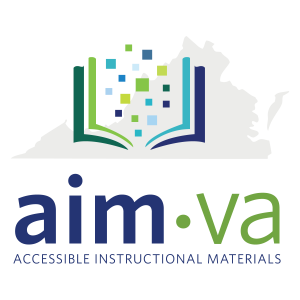The following post was written by VSTE Board Member Janet Copenhaver.
In our world today we are overwhelmed by acronyms that are used in government and education and especially social media. However, today I am taking the liberty of creating a new one called the 4 T’s of Technology-Training-Thinking-Teacher.
First T: Technology-try-try-try
As technology changes rapidly every few months, we have to investigate ways to keep up the pace. When school divisions are implementing 1:1 mobile technology, many factors should be considered. Among these are relevance to curriculum, adaptability, and sustainability. Letting your curriculum drive technology purchases will result in a successful implementation if the device is relevant to your curriculum in an every day setting.
Devices should be adaptable to a current lesson plan and not be subject to an individual lesson plan created for technology. Teachers should be able to adapt and integrate any new technology into their current curricular lesson plan without having to create new plans.
A four-year sustainability plan should be in place before the first device is adopted. Although a device is so awesome and exciting the first when a student receives a device, does the excitement last the next year and so on? Will these same devices continue to be exciting for students? Plans should be in place to integrate new activities each school year so that technology will continue to be engaging.
Sustainability should be a part of the technology budget each year and a four-year refresh program should be developed into the long-range plan. If technology does not work, enjoyment and engagement begin to fade.
To keep up with the latest in technology try to attend conferences to collaborate and observe best new practices. Remember you do not have to reinvent the wheel-ask for help from someone who has been there.
Second T: Training-train-train-train
“As more and more devices and technological applications are added to our schools, it becomes necessary to provide professional development to keep up with the pace.” Janet Copenhaver
This statement by Sam Carlson and Cheick Gadio probably sums up my thinking of why teachers should be involved in Educational Technology training…
Experience around the world in developing, industrialized, and information-based countries has shown that teacher training in the use and application of technology is the key determining factor for improved student performance (in terms of both knowledge acquisition and skills development enabled by technology). Educational technology is not, and never will be, transformative on its own—it requires teachers who can integrate technology into the curriculum and use it to improve student learning. In other words, computers cannot replace teachers—teachers are the key to whether technology is used appropriately and effectively.
From TEACHER PROFESSIONAL DEVELOPMENT IN THE USE OF TECHNOLOGY, Carlson and Gadio.
I believe that teachers need a beginning foundation of technology knowledge that is relevant and easily adaptable into their lesson plans. The one-time technology training is certainly not enough as technology changes so rapidly every year. Technology Professional Development should be on going and at a pace to keep up with new technologies. No longer should we just provide a workshop on PowerPoint, Keynote, or other presentation tools without providing the skills for teachers to adapt the applications into a lesson plan that will benefit their students.
I have been an educator for many years and I have observed that most staff members have an expectation of training when their school division adapts new things. Should we not do the same thing for our staff when we add new technologies and mobile devices? Adding these technologies without training will result in the devices and technologies not being used to their full potential. As portable learning becomes our norm and we are not confined by walls but can educate at anytime or anyplace, lets move forward with our students.
I urge all Tech Directors to ensure that your staff has Educational Technology training in your division. I also urge all teachers to request this training when new technology ordevices are added to your classroom.
Third T: Thinking-think-think-think
Perhaps the greatest compliment I received in my years of being a Technology Director was, “Janet you are a radical thinker ”. I realize it takes all kinds of thinkers in this world to succeed but I also believe if you are going to be successful in technology you must take risks and begin to think differently. Years ago as 1:1 mobile devices were beginning to be the buzzword; many technologists were caught up in the device war of which one to choose. My philosophy when I talked to school divisions was just “pick one”. If you wait until the “perfect” device comes along, your division will lag far behind. Take a risk, choose a device, implement with training, and if you have to regroup in another direction it is o.k. Remember, there are no mistakes in technology; they just become challenges to us all.
Collaborative thinking becomes important when new technologies are introduced. What better way to check with your peer about something they implemented than attending a conference? Again, conferences are important to challenge and guide participants to think, communicate and create. A good quote from Mark Twain “The secret of getting ahead is getting started.”
Fourth T: Teachers teacher-teacher-teacher
The greatest champion of any implementation is a teacher. If teachers have a comfort level of knowledge with technology, integration becomes a second nature to them. Be transparent with on-going training and support with your teaching staff. One of my favorite times of training was a technology camp at night. We introduced many new techniques at our Teaching and Learning Conference at the end of the school year. At the beginning of the new school year, we held technology camps beginning at 7 p.m. at night. During these camps we introduced new technological concepts and how they would benefit a classroom. We also covered many new social medias and how to use them in instruction. All classes were filled and we had to close the sessions at a certain time because the teachers wanted to stay longer. Support staff was available to teachers during the school day and after hours to help with projects or integration activities.
So let’s remember the importance of the 4 T’s of Technology working together as a unit. Guidelines that are best practices and research based practices are available to establish a training program that best fits your division. I have listed some of these for you to investigate.
The SAMR model is used to help teachers infuse technology into teaching and learning. I like Kathy Schrock’s guide to SAMR.
ISTE standards for teachers is a guide for Educational Technology Training.
VSTE offers the new enhanced foundational standards for teachers and found on VSTE’s web page.
Whatever training you choose; make it transparent, on going and rewarding.











